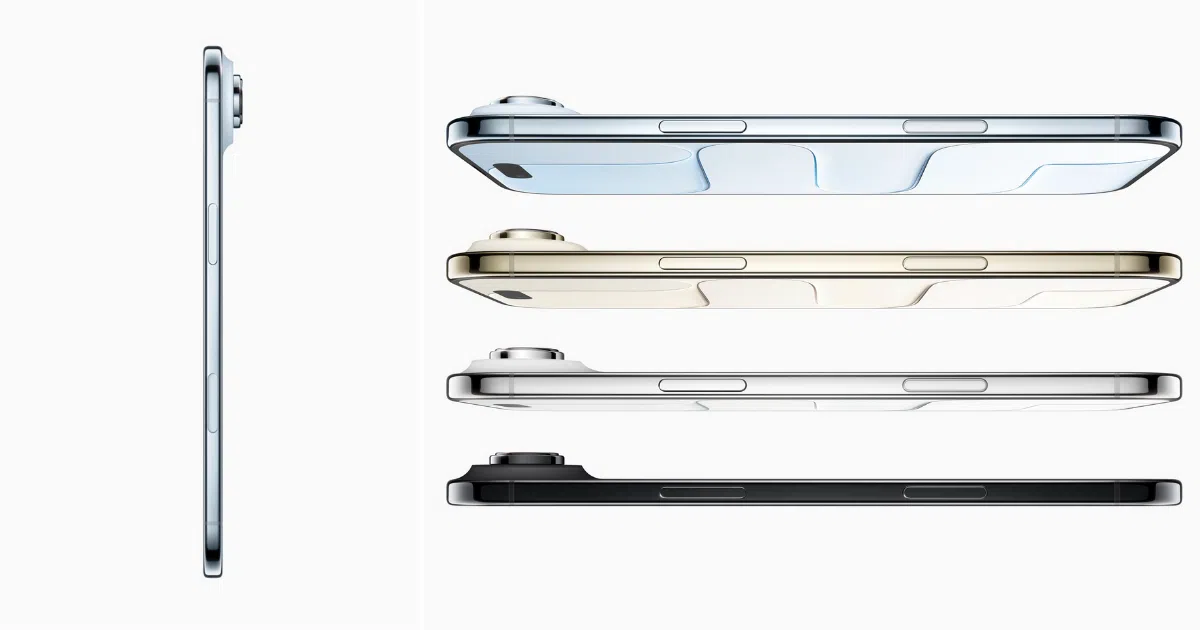Apple unveils iPhone 17 Air, iPhone 17 Pro amid AI race and US tariff pressures
Sign up now: Get ST's newsletters delivered to your inbox

Apple CEO Tim Cook holding the new Apple iPhone 17 Pro and iPhone 17 Air at the Sept 9 Apple product launch event in Cupertino, California.
PHOTO: EPA
- Apple unveiled the iPhone 17 lineup, including the ultra-thin "iPhone 17 Air" at 5.6mm, aiming to spark a new wave of upgrades amid market pressures.
- The new iPhones feature AI updates within "Apple Intelligence", but Apple faces pressure to enhance its AI and Siri despite rumoured plans and partnerships.
- Apple faces challenges from tariffs and production costs, keeping prices the same, but shares fell 1.35% due to investor concerns about profit margins.
AI generated
SAN FRANCISCO - Apple unveiled its iPhone 17 line-up on Sept 9, featuring its thinnest smartphone ever, as the tech giant works to prove it can keep pace in the generative AI race.
The Silicon Valley powerhouse held its annual iPhone release event amid mounting pressures: The White House is pushing the company to reduce its dependence on Chinese manufacturing, while investors question whether Apple is truly ready for the artificial intelligence age.
Adding to these challenges, the company faces headwinds from US President Donald Trump’s high tariff policies. Apple shares have dropped more than 3 per cent since the Republican took office in January.
Against this backdrop, Apple is betting on a product that it hopes will spark a super-cycle of iPhone purchases and reverse the trend of customers holding on to their devices longer before upgrading.
To reinvigorate its brand, Apple introduced the iPhone 17 Air, which chief executive Tim Cook called “a total game changer”.
At just 5.6mm thick, the US$999 device features Apple’s new A19 Pro processor – its most powerful iPhone chip to date – and promises all-day battery life with up to 40 hours of video playback.
The Air joins Apple’s standard line-up, including the premium iPhone Pro 17, the company’s most expensive and highest-performing model.
The new line-up will be available for purchase in Singapore starting from Sept 19, while pre-orders begin at 8pm on Sept 12.
The price point for the new Air starts from $1,599 and goes up to $2,199, depending on the storage space. The standard iPhone 17 model with 256GB of storage space is priced at $1,299, and $1,599 for 512GB of space.
While all new devices incorporate generative AI technology, Apple made no major announcements about expanding its AI capabilities beyond updates to existing features in its “Apple Intelligence” suite.
The company’s AI push has struggled to gain traction since it launched “Apple Intelligence” in late 2024.
Users have been particularly disappointed with improvements to its digital assistant Siri, which remains surprisingly basic despite years of promises.

Apple unveiled its iPhone 17 line-up on Sept 9, featuring its thinnest smartphone ever, as the tech giant works to prove it can keep pace in the generative AI race.
PHOTOS: APPLE
Apple reportedly plans to integrate AI into online search in 2026 and overhaul Siri, though the company has not confirmed these reports.
The tech giant is also said to be partnering Google to tap its search and AI expertise.
Pivot to Air
Industry analysts see the iPhone Air as a strategic pivot, with Apple positioning ultra-thin design – rather than larger screens – as its new premium selling point.
The super-slim profile could also pave the way for Apple’s long-rumoured foldable iPhone, expected as early as 2026. Samsung and China’s Huawei already offer foldable smartphones.
However, engineering such thin devices presents challenges: higher production costs and reduced battery space, though Apple claims 24-hour battery life for the iPhone 17 Air when fully charged.
Despite tariffs that increase production costs, Apple kept iPhone prices unchanged from 2024’s equivalent models – a move that may squeeze profit margins.
Mr Cook revealed in July that Mr Trump’s tariffs cost Apple US$800 million (S$1.03 billion) in the last quarter, with an estimated US$1.1 billion impact expected in this quarter.
Apple shares fell 1.35 per cent shortly after pricing details were announced, reflecting investor concerns about the company’s ability to maintain its profit margins.
Apple also introduced the AirPods Pro 3, featuring enhanced noise cancellation and real-time translation capabilities, along with the Apple Watch Series 11, which includes 5G connectivity, extended battery life, and heart health monitoring features pending regulatory approval. AFP
Additional reporting by Sarah Koh


